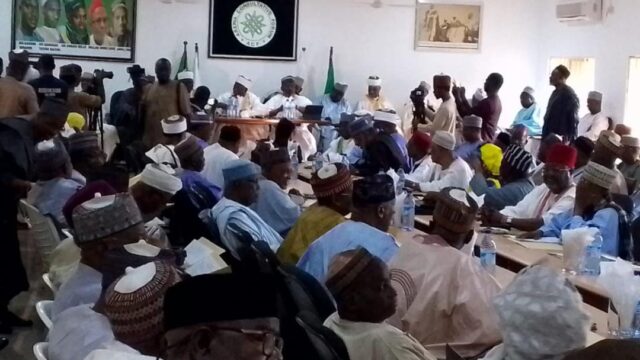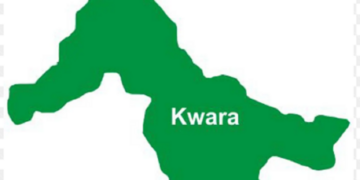Arewa leaders, under the auspices of the Arewa Consultative Forum (ACF), have expressed concern about the present socio-political dispensation of insecurity and economic hardship in Nigeria and expressed commitment to defending the interests of the North and Northerners in the future.
This is even as they agreed that they are ready for any constitutional review and restructuring of the country under President Bola Tinubu’s Government.
The ACF summoned a meeting of its Board of Trustees (BoT), headed by its Chairman, Alhaji Bashir Mohammed Dalhatu, at the National Headquarters in Kaduna. Several Northern leaders were in attendance, including former governors, Senators, military generals, and the Secretary to the Government of the Federation.
In his address, the ACF BoT Chairman, Dalhatu, said that “going by the pronouncements and actions of some officials of the federal government, especially in view of recent pressures coming from some self-serving groups, the presidency may not be averse to making a similar attempt at an unnecessary constitution review before the end of their tenure.”
According to him, “whether or not the federal government sponsors one or more exercises at constitutional review, it is necessary to dispel the impression that the North is shy, or is averse to or afraid of any review of the Nigerian Constitution.”
“Nothing can be further from the truth. We must put all and sundry on notice that the North is ready, now and in the future, and will be willing to consider any proposals for changing the constitution and the administrative structure of Nigeria that may be put on the table. If and when the occasion arises, the North will use whatever is available to pursue its legitimate interests.”
Dalhatu added, ” These are only a few of the issues we thought this and perhaps subsequent meetings of the ACF should have on its agenda. They are not exhaustive, and members will be welcome to propose additional agenda items for consideration.”
He further explained that the meeting was not designed to apportion blame or point fingers at any individual or group of individuals for the problems of the North. He, however, pointed out that “the truth is that we are, at our different levels, all culpable.”
“As a matter of fact, we owe our people, the people of Northern Nigeria, deep apologies for our collective failure to protect the region from falling into one of the worst crises in its history.”
“From the personal introductions made, it is clear that a huge number of the elders and thoughtful leaders from every part of Northern Nigeria are seated in this hall for the meeting. This is an outcome that should gladden our hearts and encourage us in the future to remain optimistic. It is possible to envisage One North, One People, One Destiny!
“The ACF, our umbrella platform, is neither pro-government nor anti-government at any level. We are pro-North. We shall acknowledge good deeds but firmly resist unfair and unjust treatment against us.
“The challenges before us at this meeting are twofold: first, fixing the ACF as a special purpose vehicle without which we cannot get well organized and, secondly, exploring strategies of tackling the existential challenges facing the North and Nigeria as a country.
These tasks are the reason for calling the meeting, and they will form the main agenda.”
Meanwhile, ACF has lamented the “waning interest and declining participation in it by the leaders and elders of the North, including the teeming youth population”, while urging them to be more proactive in fighting the common problems of the North.
“As earlier highlighted in our letter of invitation, this is a meeting of concerned Northerners against the background of the grave and escalating crisis of nationhood plaguing Nigeria in general and Northern Nigeria in particular. It is not about politics and definitely not about partisanship. Far from it.”
“The overriding objectives of this meeting have been made clear from our correspondences and subsequent discussions on social media and other forums. They are twofold: One, to set in motion the process of revitalising, re-inventing and re-strategizing the Arewa Consultative Forum, to enable it to play the role intended for it by the founding fathers some 24 years ago.
Two, draw up plans, preferably a road map, to help our region and country address or significantly mitigate its existential challenges.”
However, Dalhatu also identified the nature of the problems and actions sought at the national level to address the challenges in the north and Nigeria.
Listing them as security of Lives and property, he said, “At the moment, there is nothing troubling the North more than insecurity”.
“The historically quiet, peaceful and prosperous North is today ravaged by Boko Haram and other insurgencies, banditry, as well as other violent crimes. The menace of drug trafficking and abuse keeps growing by the day. There does not appear to be any end in sight. Because of the strife, food production is becoming increasingly difficult as farmlands are abandoned and the farmers are either killed or are fleeing to the IDP camps.”
He stressed, “Whatever it takes, this crisis has to end and end quickly. Our survival depends on it.”
He further identified “deepening levels of poverty, destitution and hunger; growing joblessness especially among the youth and the twin calamities of almajiri and street children are all crying for solution”.
“Environmental Degradation and the Crisis of Climate Change. The dreaded aftermath of climate change seems to be upon us. And with it have come extreme weather events: drought, floods, environmental degradation and more. Mitigation and other measures must be taken urgently before it becomes a fully blown emergency. ”
“Corruption and Bad Governance: The most serious impediment to realising the dreams of peace, security and development is corruption at all levels, in and outside government offices. Corruption fosters bad governance, leading to a riot of evils including distortion of moral values, treasury looting, injustice, misplacement of priorities, etc.”
Dalhatu further stressed, ” Nigeria urgently needs an all-out war against corruption. Political pressure has critically undermined the effectiveness and sanctity of Traditional Institutions. As a result, their standing with their subjects, influences, and authority has been eroded. Security, law and order, conflict prevention, and resolution are all impaired.
Addressing this problem must count as a priority for the North”
Again, on Constitution Review and Restructuring, he remarked, “twice since the inception of the 4th Republic, in 2005 and 2014, both when southerners held the presidency, the Federal Government of Nigeria pushed through so-called political reform conferences. The advertised aim of these conferences was to amend some provisions of Nigeria’s 1999 constitution ostensibly to achieve faster development.”
“In reality, however, the hidden agenda underlining these actions was almost always sinister and often designed to harm the North”, he added.
Some of the Northern leaders in attendance were Senator Ibrahim Shekarau, former governor of Kano and protem chairman of League of Northern Democrats; Senator Tanko Almakura, former governor of Nasarawa state; former National Chairman of APC, Abdullahi Adamu; General Halilu Akilu, former minister of Internal Affairs, General Muhammad Maigoro, Senator Kabiru Gaya former governor of kano state, Yayale Ahmed former SGF, former National Chairman of PDP, Adamu Muazu, former governor of Jigawa state, Sule Lamido, former governor of Kaduna state Ramalan Yero, former SGF Babachir Lawal.
Others were the immediate SGF, Boss Mustapha, the Former minister of state defence, Lawal Batagarawa, the Former Inspector General of Police, MD Abubakar, DIG Aliyu Attah (Rtd), and the Former governor of Jigawa state, Sa’ad Birnin Kudu.











